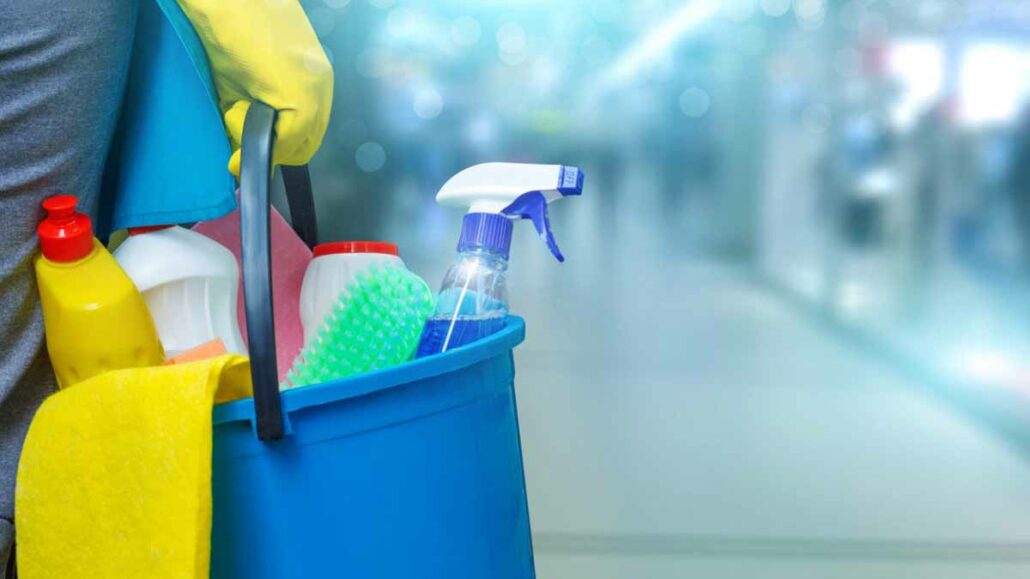Running a cleaning business can be rewarding, but it also comes with its own set of risks. From accidental property damage to customer injuries, unexpected events can threaten your financial stability. Fortunately, insurance for cleaning businesses can provide a safety net, protecting you from these unforeseen costs. In the following sections, we’ll explore the different types of insurance available and how they can safeguard your business, ensuring you can focus on delivering exceptional cleaning services.

Why Insurance is Vital for Cleaning Businesses
Even the most meticulous cleaners can encounter situations beyond their control. Here’s why having the right insurance is crucial:
Client Mishaps
A slip and fall on a wet floor, a broken antique, or damage to expensive electronics – these incidents can lead to lawsuits. General liability insurance safeguards your business from financial repercussions arising from property damage or bodily injury claims by clients.
Employee Protection
If an employee gets injured while cleaning, workers’ compensation insurance covers medical bills and lost wages, ensuring their well-being and protecting your business from legal complications.
Peace of Mind
Knowing you’re covered allows you to focus on what matters most – delivering exceptional cleaning services. Insurance provides peace of mind, empowering you to operate your business with confidence.
Types of Insurance for Cleaning Businesses
The specific insurance needs of your cleaning business will depend on various factors, including the size of your operation and the services you offer. Here’s a breakdown of the most common types of coverage:
General Liability Insurance
This fundamental policy shields your business from financial losses due to third-party bodily injury or property damage claims.
Workers’ Compensation Insurance
This mandatory insurance (in most states) safeguards your employees by covering medical expenses and lost wages if they get hurt or become ill while working.
Commercial Auto Insurance
If your business utilizes vehicles for transportation or equipment, commercial auto insurance protects you against accidents, theft, and vandalism.
Business Property Insurance
This policy covers damage or loss to your business property, including equipment and cleaning supplies, due to fire, theft, or weather events.
Errors and Omissions Insurance (E&O)
This coverage protects your business from claims of negligence resulting in financial loss for your clients. For instance, if a cleaning solution damages a client’s carpet, E&O insurance could help cover the cost of repairs or replacements.
Understanding Coverage Limits and Exclusions
Every insurance policy comes with coverage limits (the maximum amount the insurer will pay) and exclusions (events or situations not covered). Carefully review your policy documents to understand these limitations:
General Liability Limits
Standard GL policies typically offer split limits, for example, $1 million per occurrence and $2 million aggregate. This means the insurance company will pay up to $1 million for a single claim and a maximum of $2 million for all claims throughout the policy period.
Workers’ Compensation
Limits for workers’ compensation vary by state and depend on factors like employee salary and type of injury.
Tailoring Your Insurance Coverage
The specific insurance needs of your cleaning business will depend on factors like:
- Size and Scope of Operations: A solo cleaner will have different needs compared to a large commercial cleaning company.
- Services Offered: Specialization in carpet cleaning, window washing, or post-construction cleaning might require additional coverage.
- Location: State regulations and client requirements can influence insurance needs.
Getting a Quote and Choosing the Right Insurance Provider
- Shop around: Obtain quotes from multiple insurance companies or brokers specializing in business insurance for cleaning businesses.
- Ask questions: Don’t hesitate to ask questions about coverage details, exclusions, and policy limits.
- Consider bundled policies: Bundling your insurance needs (e.g., GL and property) with one provider can sometimes lead to cost savings.
- Read reviews: Check online reviews and seek recommendations from other cleaning business owners.
FAQs on Insurance for Cleaning Businesses
Do I need insurance for my cleaning business?
In most cases, yes. General liability insurance is highly recommended, and workers’ compensation insurance is mandatory for businesses with employees (except in Texas).
How much insurance do I need?
The amount of coverage you require will depend on the size and scope of your cleaning business. Consulting an insurance agent can help you determine the appropriate limits for your specific needs.
Where can I get insurance for my cleaning business?
Several insurance companies offer policies tailored for cleaning businesses. You can obtain quotes from different providers to compare rates and coverage options.
What factors affect the cost of cleaning business insurance?
The cost of your insurance policy will be influenced by factors like the size of your business, the services you offer, your claims history, and your payroll (for workers’ compensation).
Conclusion
Insurance may seem like an additional expense, but it’s a crucial investment in the long-term security and sustainability of your cleaning business. By understanding your insurance needs, choosing the right coverage, and working with a reputable provider, you can shield your business from financial risks and focus on delivering exceptional cleaning services to your clients.

